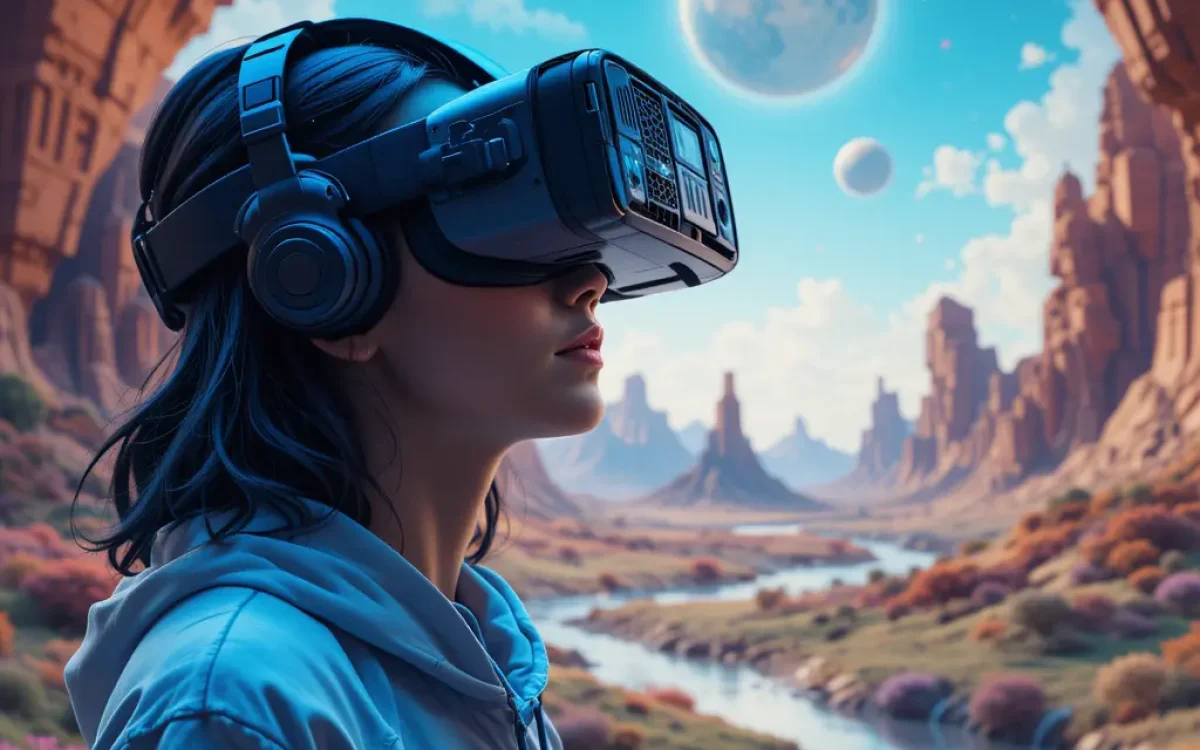Imagine a world where your favorite video game adapts to your every move, creating a unique adventure each time you play. This is the promise of AI in gaming, a technology that is reshaping how we experience virtual worlds. AI enhances game dynamics by learning from player behavior, offering personalized challenges and narratives. As developers integrate AI, games become more interactive and engaging, providing players with an immersive experience like never before. This article explores how AI is transforming gaming, making it more dynamic and tailored to individual preferences.
The Evolution of AI in Gaming
The journey of AI in gaming has been nothing short of revolutionary. From the early days of simple algorithms to today’s complex systems, AI has transformed how we experience games. As a Game Development Expert, I find it fascinating how AI in Gaming: Revolutionizing Immersive Experiences has become a reality.
From Simple Beginnings to Complex Systems
In the early days, AI in games was basic. Think of the ghosts in “Pac-Man” or the predictable patterns in “Space Invaders.” These were simple, yet they laid the groundwork for what was to come. Fast forward to today, and we have AI that can adapt, learn, and even surprise players. For instance, the AI in “The Last of Us” creates enemies that react to the player’s actions, making each encounter unique. This evolution is akin to teaching a child to ride a bike and watching them grow into a professional cyclist.
Personal Insights and Anecdotes
Reflecting on my own experiences, I remember working on a project where we aimed to create an AI that could mimic human-like decision-making. It was challenging, but the result was rewarding. Players often commented on how the AI felt almost human, which was our goal. This kind of feedback is what drives innovation in the industry. It’s not just about creating a game; it’s about crafting an experience that resonates with players on a deeper level.
In my opinion, the future of AI in gaming holds endless possibilities. As technology advances, so will the capabilities of AI, further enhancing our immersive experiences. The journey is ongoing, and I, for one, am excited to see where it leads us next.
Enhancing Realism and Interactivity
In the world of gaming, realism and interactivity are the heartbeats that bring virtual worlds to life. As a Game Development Expert, I have seen firsthand how AI in Gaming: Revolutionizing Immersive Experiences has transformed these elements, making games more engaging and lifelike. Imagine playing a game where the characters not only react to your actions but also adapt and learn from them. This is the magic of AI.
Realism Through AI
AI has the power to enhance realism in games by creating environments that mimic real-world physics and behaviors. For instance, in a racing game, AI can simulate weather conditions that affect car handling, making the experience more authentic. I remember playing a game where the AI-controlled characters would remember past interactions, altering their behavior based on my previous choices. This level of detail adds a layer of depth that was unimaginable a few years ago.
Boosting Interactivity
Interactivity is another area where AI shines. Games now offer dynamic storylines that change based on player decisions, thanks to AI algorithms. This creates a unique experience for each player, as no two playthroughs are the same. I once played a role-playing game where my choices led to unexpected alliances and rivalries, making the story feel personal and immersive. In my opinion, this is where AI truly revolutionizes gaming, by making players feel like an integral part of the game world.
AI-Driven Personalization in Games
AI-driven personalization in games is reshaping how players engage with virtual worlds. Imagine stepping into a game where the environment adapts to your play style, much like a tailor fitting a suit. This is the magic of AI in gaming: revolutionizing immersive experiences. As a game development expert, I find this evolution both fascinating and essential for the future of gaming.
Dynamic Storytelling and Player Engagement
One of the most exciting aspects of AI-driven personalization is dynamic storytelling. Games can now adjust narratives based on player choices, creating a unique journey for each individual. For instance, in role-playing games, AI can alter the storyline depending on whether you choose to be a hero or a villain. This not only enhances replayability but also deepens player engagement. I remember playing a game where my decisions led to an unexpected plot twist, leaving me both surprised and thrilled. Such experiences are what make gaming truly immersive.
Adaptive Difficulty and Personalized Challenges
Another significant benefit of AI in gaming is adaptive difficulty. Games can assess a player’s skill level and adjust challenges accordingly. This ensures that players remain engaged without feeling overwhelmed or bored. For example, if a player struggles with a particular level, the AI might offer subtle hints or reduce the difficulty. Conversely, if a player breezes through, the game might introduce tougher enemies or puzzles. This personalized approach keeps the experience fresh and exciting. In my opinion, this is a game-changer, as it caters to both novice and veteran players alike.
Challenges and Future Prospects
As AI continues to evolve, its integration into gaming presents both exciting opportunities and significant challenges. The journey of AI in gaming is like navigating a complex maze, where each turn offers new possibilities and obstacles. As a Game Development Expert, I find this evolution both thrilling and daunting.
Challenges in AI Integration
One of the primary challenges is ensuring that AI behaves in a way that feels natural to players. Imagine playing a game where the AI opponent suddenly makes an illogical move. It breaks immersion and can be frustrating. Developers must balance AI intelligence with unpredictability to maintain engagement. Another hurdle is the computational power required. Advanced AI systems demand significant resources, which can be a barrier for smaller studios. Additionally, there’s the challenge of ethical considerations. AI in gaming must respect player privacy and avoid manipulative practices.
Future Prospects and Opportunities
Despite these challenges, the future of AI in gaming is bright. AI can create more personalized gaming experiences, adapting to individual player styles and preferences. This personalization can lead to more engaging and immersive experiences. For instance, AI could adjust the difficulty level in real-time, providing a tailored challenge for each player. Moreover, AI can enhance storytelling by creating dynamic narratives that evolve based on player choices. This potential for revolutionizing immersive experiences is what excites me the most. As AI technology advances, we can expect even more innovative applications in gaming, making it an exciting field to watch.
Conclusion
As we wrap up our exploration of AI in gaming, it’s clear that this technology is not just a fleeting trend. It’s a transformative force reshaping how we experience games. From creating lifelike characters to generating dynamic worlds, AI is at the heart of this evolution. I remember playing a game where the AI adapted to my strategies, making each session unique and challenging. It was like playing chess with a friend who learns and grows with you.
The Future of Gaming
AI in Gaming: Revolutionizing Immersive Experiences is more than a catchphrase; it’s a reality. Imagine a game where the NPCs remember your past interactions and react accordingly. This level of immersion is becoming possible thanks to AI. As a game development expert, I believe that AI will continue to push boundaries, offering players experiences that are both personal and unpredictable. It’s exciting to think about the possibilities.
In conclusion, AI is not just enhancing games; it’s changing the very fabric of how we play. Whether you’re a casual gamer or a hardcore enthusiast, the impact of AI is undeniable. It’s like having a co-pilot in your gaming journey, guiding and challenging you in ways we never thought possible. As we look to the future, one thing is certain: AI will keep revolutionizing immersive experiences, making gaming more engaging and enjoyable for everyone.






